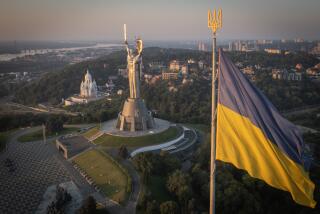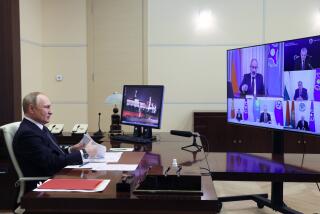Shevardnadze, Dobrynin Visit Kabul After Afghan Truce Offer
- Share via
MOSCOW — Soviet Foreign Minister Eduard A. Shevardnadze flew to Kabul on Monday for talks with Afghan leader Najib following Najib’s offer of a cease-fire in the seven-year-old war with Muslim rebels.
The official Soviet news agency Tass reported the visit but offered no explanation. It said Shevardnadze was accompanied by Anatoly F. Dobrynin, a top foreign affairs specialist and former longtime ambassador to Washington.
Tass said Shevardnadze and Dobrynin were on a “working visit” at the request of the Soviet-backed Afghan government. It gave no indication of how long they will stay in Kabul, which on occasion has been the target for rebel rocket attacks. They were reported to have been greeted by Najib at the airport.
Their visit apparently underscores the Kremlin’s support for Najib’s proposal last week for a six-month cease-fire with the guerrillas. It was the highest-level delegation from Moscow to visit Kabul in recent years, although the Soviet Union has an estimated 115,000 troops in Afghanistan supporting the government against the rebels.
Western diplomats here said they were surprised by the announcement of the Shevardnadze-Dobrynin mission. They said they have no knowledge of its purpose.
“But it appears to cap a Soviet-Afghan peace offensive which has been going on for a couple of months,” one Western diplomat said, asking not to be identified by name or country.
Western-backed opponents of the Kabul regime have rejected the cease-fire proposal despite Najib’s offer to negotiate with leaders of guerrilla groups based outside Afghanistan--an unprecedented concession.
‘National Unity Government’
Najib, who is general secretary of the Peoples’ Democratic Party of Afghanistan, also proposed a “government of national unity” as part of his plan to end the fighting.
But diplomats in Moscow said he paid scant attention to the presence of Soviet forces in Afghanistan, a matter that the rebels regard as the major stumbling block to a political settlement of the war.
The Soviet Union said in October that it was withdrawing six regiments from Afghanistan, but U.S. officials said the troops were replaced by others, so there was no actual reduction of Soviet forces in the country.
Najib’s reference to the possibility of a coalition government, one Western observer said, recalled similar proposals made in East European countries after World War II. These, he stressed, led to Communist takeovers.
Western Dirty Work
In the past, the Soviet Union has denounced the leaders of the Muslim guerrillas as little more than bandits who do the dirty work for Western imperialists, especially the United States. But Moscow has welcomed the Najib plan for talks with the rebel commanders, and Tass has carried strong endorsements of the plan from other Communist capitals.
Najib proposed the cease-fire two weeks before the start of a meeting of Muslim nations in Kuwait. It may be that Najib is trying to mute Muslim criticism of the Soviet military presence, a Western diplomat said.
More to Read
Sign up for Essential California
The most important California stories and recommendations in your inbox every morning.
You may occasionally receive promotional content from the Los Angeles Times.










